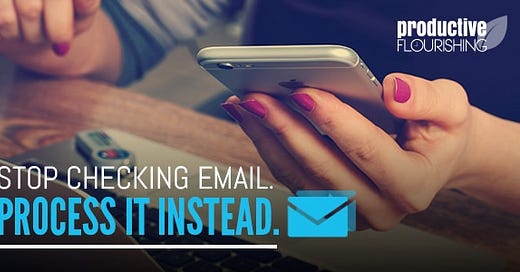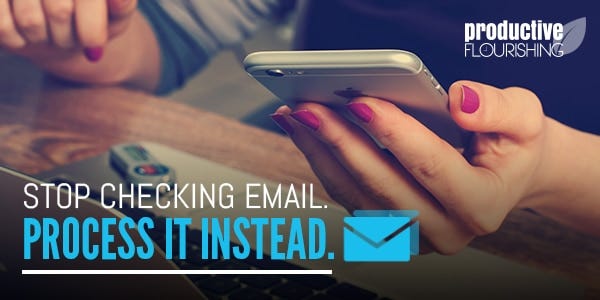Stop Checking Email. Process It Instead.
It's more effective to plan when you're going to process email messages than it is to get lost for an hour
Odds are, if you're reading this, you've probably checked your email a few times today. And I have a couple of questions for you:
Why are you checking your email?
What's in there that will really make a difference in what you're doing for the day?
Take a second to think about your answers. If you say "I don't know," keep reading. If you have a good answer to either question, keep reading. While I've got you thinking about email, I'd like you to think about checking email. I'll say this in very clear terms: the only time you should check email is when you're anticipating receiving a message that answers some specific question that is relevant to the task at hand. Hold onto that thought while I answer an objection that just popped up for a lot of people: "But email is the way my employer communicates about what work needs to be done!"
If you're in a work environment where people use email to change what you should be doing for the next few hours, then you're in a different situation; do what you can to change this practice, though. It's hard to focus on any given task when you know there really might be a message in your inbox that would change what you ought to be working on.
The psychic RAM being taken up by the fear and uncertainty caused by email task management has serious negative effects on collective productivity. It ends up with everyone watching their inboxes and a need to read redundant or unnecessary messages to make sure that there wasn't a priority change in those messages.
All that watching, waiting, and reading comes at the cost of the work that actually needs to be done. I think that's where a lot of our problems with email originate, and unfortunately we perpetuate that problem in our own habits. So let's move beyond "checking email" to "processing email."
Checking Email Is Different Than Processing Email
What's the difference? It all boils down to "beginning with the end in mind." When you check email in the way that most people check email, you're inviting yourself to jump on the Infinite Loop of Technological Distractions: a message in your inbox causes you to go to a website, that website sends you to another, you want to check in on Twitter, and on you go, until you've finally forgotten why you're where you are in the first place.
When you finally get your wits about you, you return to your inbox — probably to find more stuff in there, and the cycle begins anew. Note that when you check email in the way that I described before this section, you're less likely to start the Loop. You're looking for a specific message that answers a specific question for a specific purpose. If that message is not there, then you can get back to whatever you were doing. If it is, then it allows you to move that project along. When you process email, the intention is not to see what's in there — it's to get stuff out of your inbox.
Normally I say that email isn't the work you do, but in the case of processing email, it is the work you're doing. This is where thinking about email messages as objects comes in handy: the only messages that should send you running around the Web are the Jumbos (emails that require some thought and research to even process), but if you're just processing email, you don't necessarily have to get everything out of your inbox.
Despite what the Inbox Zero fans may say, it's enough to know that everything in your inbox requires action and that you know, roughly, what actions they require. Yes, it would be better if you could get your inbox to zero, but you may find it easier to schedule a time to get it processed and then schedule another time to act on the individual messages, rather than trying to "clear out" each message you read.
One last thing: you probably noticed that I say "email messages" more than I say "email." I do this to reinforce the fact that "email" consists of discrete messages that need to be acted on. I have found that people are far more likely to actually do the email correspondence they need to do when they see it as "writing 7 emails [translate: email messages]" rather than "clear their inbox." Likewise, it's easier to see that answering 5 email messages a day will keep your inbox clear, rather than thinking in terms of "keeping my inbox clear."
So when I say "stop checking your email," I'm not saying "abandon it." I'm saying that it's more effective to plan when you're going to process email messages than it is to get lost for an hour because you're checking email.





